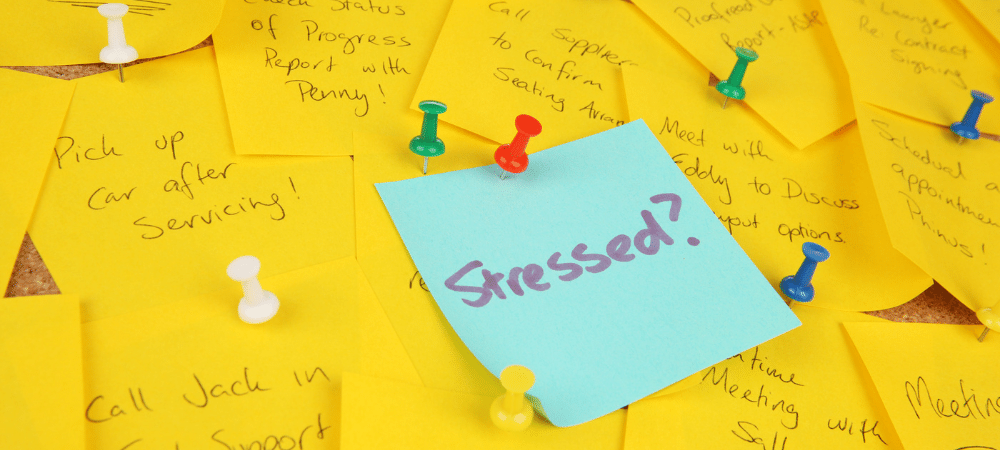
Most of us have felt "stressed out," from time to time, but when this feeling persists, stress becomes chronic and can negatively impact our careers, quality of life, and our bodies. April is stress awareness month. To manage stress, the first step is to pinpoint your stressors. To identify true sources of stress, look closely at your habits, attitude, and excuses. Pinpointing stressors may be difficult because some of them may be very subtle. Sometimes we fail to notice our own stress-inducing thoughts, feelings, and behaviors.
Tips to Help Manage Stress:
- Pinpoint stressors. Try starting a stress journal. Each time you feel stressed, keep track of it. You will start to see patterns and themes. Things to write down include: the cause of stress, how you felt (physically and emotionally), your reaction, and what you did to make yourself feel better. Think about how you currently manage and cope with stress. Are your strategies healthy or unhealthy?
- Know your limits. It may be surprising to discover the number of stressors that can be reduced and/or eliminated. Learning to say no is an important part of knowing your limits and sticking to them. Whether it is for personal or professional reasons, taking on more than one can handle is a guaranteed recipe for stress. Be mindful of your current schedule and commitments.
- Alter stressful situations. If it's not possible to avoid a stressful situation, try to alter it. Deal with problems head on and do your best to anticipate and prevent them. Poor time management can cause stress. When you're stretched too thin and behind, it's hard to stay calm and focused. Plan ahead and make sure you don't overextend yourself.
- Try changing the reaction. If changing a stressor is not probable, try changing the reaction to it. Adapting to stressful situations can help regain a sense of control by altering expectations and attitude. Try to view stressful situations from a more positive standpoint. Take perspective of the situation. Ask yourself how important it will be in the long run.
- Nurture yourself for improved health. Beyond a take-charge approach and a positive attitude, stress levels can be reduced by nurturing yourself. Set aside time to relax in your daily schedule. Do something enjoyable every day, whether it is playing the piano, dancing, singing, going for a walk, calling a good friend, working on crossword puzzles, or reading a book. Everyone is different, so it's important to discover what is relaxing for you.
- Increase your resistance to stress. Regular physical activity and healthy eating patterns can help combat stress. Make time for at least 30 minutes of activity every day. Find activities that are enjoyable and that can be done with a friend or group to increase accountability. Start your day off with a healthy breakfast and keep your energy up and your mind clear with balanced, nutritious meals and snacks throughout the day.
Stress is defined as mental, emotional, or physical tension or strain and too much can negatively impact health. Some ways to lower stress are to make a conscious effort to spend more time in a lower gear, take time in between bursts to rest and recuperate, or learn how to change your point of view and look at the positive rather than the negative aspect of a situation. For more information about stress and wellness resources, check out https://ruralwellness.unl.edu/resources.
Source:
- Federal Occupational Health. Take time to unwind: It's healthy to relax, renew, and rejuvenate. United States Department of Health and Human Services. Accessed at: https://foh.psc.gov/calendar/stress.
- Pish, S. (2013). April is National Stress Awareness Month. Michigan State University Extension. Accessed at: https://www.canr.msu.edu/news/april_is_stress_awareness_month.
- American Heart Association. (2021). 3 Tips to Manage Stress. Accessed at: https://www.heart.org/en/healthy-living/healthy-lifestyle/stress-management/3-tips-to-manage-stress.
- Mayo Clinic Staff. (2021). Stress Management. Mayo Foundation for Medical Education and Research. Accessed at: https://www.mayoclinic.org/healthy-lifestyle/stress-management/basics/stress-basics/hlv-20049495.
Feedback Form
Feedback Form
If you do not see the article, please scroll up the page.








